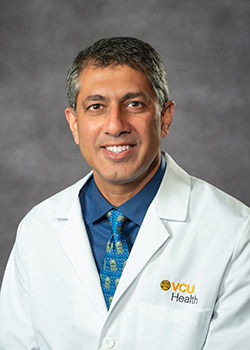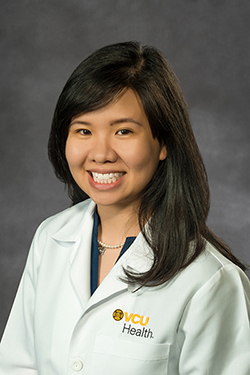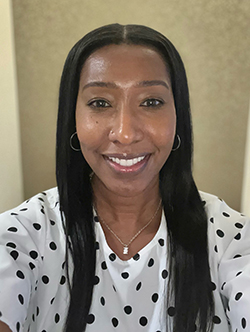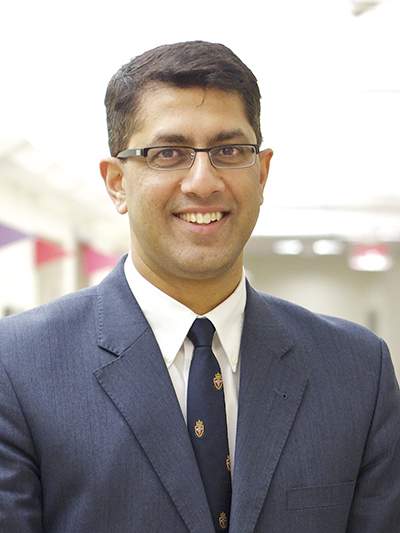Welcome to the VCU Adult Cystic Fibrosis Program!
We are a team consisting of a doctor, nurse, dietitian, respiratory therapist, social worker, pharmacist and research coordinator working together to fully meet any and all needs of our patients and families. We access other specialists when needed to meet the identified issues.
Cystic Fibrosis patients usually transition to the adult center between the age of 18-21 years.
The VCU Cystic Fibrosis (CF) Center is dedicated to providing the very best care and disease management to all of the patients with CF in Virginia and the bordering areas.
Welcome
Program Director: Nauman Chaudary, MD, FACP, FCCP
Clinic Process
Adult Cystic Fibrosis Program
 The Mayland Clinic is a component of the VCU Department of Internal Medicine. It is designed to provide comprehensive specialty medical care, nursing care and education information for patients in a variety of Internal Medicine Subspecialties.
The Mayland Clinic is a component of the VCU Department of Internal Medicine. It is designed to provide comprehensive specialty medical care, nursing care and education information for patients in a variety of Internal Medicine Subspecialties.
The Adult Cystic Fibrosis Clinic is an outpatient service of the Division of Pulmonology, Department of Internal Medicine. The Adult CF Clinic is a part of the Mayland clinic. Routine follow-up visits are provided in the clinic on Wednesdays by the physician and the CF Team. Sick visits may be seen same day in clinic if schedule permits.
Clinic Days and Urgent Care:
- Wednesday
- Urgent care visit for CF-related problems scheduled per physician availability
- For urgent/emergent CF-related problems after business hours/on weekends, patients should call (804) 828-0951 and ask to speak to the pulmonary fellow on call. Pulmonary fellow will discuss your emergency with your CF physician
Initial Visit:
- Contact our CF Office at (804) 828-1532
- Fax medical records from your previous center to (804) 828-2578
- If you have never been seen at VCU before, contact Mayland Clinic at (804) 527-4540 to get set up with a medical record number (MRN) for our electronic record system.
Follow Up Visits:
- Will be scheduled quarterly as per the CFF guidelines, or sooner if there is an acute CF-related problem that needs to be followed up.
- Routine primary care should be provided by the patient's primary care physician.
- All patients with CF should wear a mask when they come to clinic. Masks are available at the entrance of Mayland clinic. To avoid contact among CF patients, patients will call clinic and notify us of their arrival. Staff will contact patients when exam room gets available.
Missed/Late Arrival for Appointments:
- If you are more than 15 minutes late, the provider will need to approve your visit and decide whether we can still see you that day. You may need to schedule a new appointment. Please call Mayland Clinic at (804) 527-4540 as soon as you know you will be more than 15 minutes late or cannot come to clinic.
Medication Refills:
- Refill requests should come straight from your pharmacy. You can have them contact us by calling, faxing, or electronically requesting a refill.
- If you prefer, you may use the VCUHealth Patient Portal for your refill request. Please include the name of the medications, dose directions, and pharmacy contact information (phone and fax) in your message.
- Our team will make every attempt to complete your refill request within 1-2 business days. We recommend starting the refill process 7 days before you need it for retail medications and 14 days before you need it for mail order medications, as some require a prior authorization.
- Paperwork and prior authorizations may take up to 7 to 14 days to process.
- In special circumstances like inclement weather, clinic cancellations due to conferences or team travel, or other changes to clinic operations, your CF team will communicate this to you via the email ListServ.
- In the case that a CF team member will be away from clinic or out of office for an extended period of time, we will communicate this via ListServ as well. The message you receive will provide details for coverage for the team member, in case you need assistance. Please note, coverage may not be provided by the same person every time. Each instance will be addressed individually.
- If you would like to join the ListServ or verify that you are subscribed, please contact your social worker, Mahogany Snead, MSW at mahogany.snead@vcuhealth.org.
Faculty
Adult Cystic Fibrosis Program
Adult CF Program Team
Because Cystic Fibrosis is a multi-organ system disease that affects the lives of both the patient and his/her family, the Adult CF Program Team includes multi-disciplinary healthcare professionals working together to fully meet any and all needs of our patients and families.

Nauman Chaudary, MD, FACP, FCCP
Program Director

Nauman Chaudary, MD, FACP, FCCP
Program Director
Internal Medicine
Division of Pulmonary Disease and Critical Care Medicine

Trang N. Le, MD
Associate Program Director

Trang N. Le, MD
Associate Program Director
Internal Medicine
Division of Endocrinology, Diabetes & Metabolism
Email: trang.le@vcuhealth.org

Kisha Booker, RRT
Registered Respiratory Therapist

Kisha Booker, RRT
Registered Respiratory Therapist
Pulmonary Function
Phone: (804) 828-1532
Email: kisha.booker@vcuhealth.org

Jon Contreras, RD
Registered Dietician

Jon Contreras, RD
Registered Dietician
Internal Medicine
Division of Pulmonary Disease and Critical Care Medicine
Email: jon.contreras@vcuhealth.org

Mahogany Snead, MSW
Adult CF Clinic Social Worker 2

Mahogany Snead, MSW
Adult CF Clinic Social Worker 2
Internal Medicine
Email: mahogany.snead@vcuhealth.org
Pulmonary Physician
We have one CF physician who is responsible for pulmonary care in both the outpatient clinic and in-patient management of adult patients with CF in central virginia. In addition to caring for patients, our physician participate in laboratory research and direct both investigator-initiated clinical trials and those initiated through the CF TDN. Our physician strive to provide optimal clinical care for our patients while conducting research that will increase our understanding of CF and improve the lives of our patients.
Nurse Coordinator
The Adult CF Clinic at VCU has one nurse coordinator who organize clinic and schedule patients, necessary procedures, follow-up clinic visits and hospital admissions. Nurse coordinate care between patients and physicians, endocrinologist, dietitian, social worker and respiratory therapist. In addition, nurse take care of insurance precertification for clinic visits, laboratory procedures and hospital admissions.
Respiratory Therapist
Respiratory therapist is available at all clinic visits. RTs are responsible for the following:
- Pulmonary Function Tests (PFTs)
- Sputum induction
- Education on Airway Clearance Techniques (ACTs) and Nebulizers
Registered Dietitian
A registered dietitian (RD) is available to help CF patients optimize their nutritional status. When a person's nutrition status is better, so is his or her lung function. The RD's goal is to help an adult CF patient personalize nutrition-related goals to his or her own lifestyle. Nutrition visits include discussing the following:
- Personalizing weight goals
- Achieving optimal vitamin and mineral levels
- Accessing nutrition support programs
- Optimizing pancreatic enzyme dosing
- Pregnancy and lactation
- Bone health
- CF Related Diabetes
Social Worker
Social workers in the CF team have an important role to play in helping patients and their families cope more effectively with the inevitable stress of having a chronic illness. By acting as an advocate for patients, social work assessments guide CF patients toward the following:
- Income support
- Housing resources
- Education/college grants
- Help with employment
- Liaison with other agencies
- Financial and benefit advice and how to apply for disability
- Insurance related queries
Research Coordinator
We have one research coordinator who prepare Institutional Review Board (IRB) submissions for new research studies, including research study protocol summaries, consent forms, assent forms and required IRB forms, as well as protocol amendments, safety updates, and serious adverse events. These studies are part of the CF TDN or investigator-initiated by our physicians.
Cystic Fibrosis
Learn more about the disease.
We have compiled resources to help you better understand Cystic Fibrosis. Please click on the following headings for more information.
Cystic Fibrosis (CF) is an inherited disease of your mucus and sweat glands. It affects mostly your lungs, pancreas, liver, intestines, sinuses, and sex organs.
Below you will find the following information on Cystic Fibrosis:
Symptoms and Diagnosis
The most common symptoms of CF are frequent coughing with phlegm, frequent bouts of bronchitis and pneumonia, salty-tasting skin, dehydration, poor growth, and infertility, mostly in men. A sweat test is the most common diagnostic test for CF – it measures the amount of salt in your sweat. Other tests that can be used to help diagnose CF include a chest x ray, sinus x ray, CT-scan, lung function tests, analysis of sputum cultures and/or stool samples, and genetic testing of a blood sample. Prenatal genetic testing can help you find out if your baby is likely to have CF.
Associated Health Issues
Normally, mucus is watery. It keeps the linings of certain organs moist and prevents them from drying out or getting infected. But in CF, an abnormal gene causes mucus to become thick and sticky which can have negative affects on multiple areas of health. The symptoms and severity of CF vary from person to person. Some people with CF have serious lung and digestive problems. Other people have more mild disease that doesn't show up until they are adolescents or young adults.
In people with CF, mucus builds up in the lungs and blocks the airways, creating an environment that makes it easy for bacteria to grow and leads to repeated serious lung infections. Over time, these infections can cause serious damage to the lungs. Respiratory failure is the most common cause of death in people with CF.
The mucus can also block tubes, or ducts, in your pancreas. As a result, digestive enzymes that are produced by your pancreas cannot reach your small intestine. These enzymes help break down the food that you eat. Without them, your intestines cannot absorb fats and proteins fully. Nutrients leave your body unused, and you can become malnourished. Your stools become bulky. You may not get enough vitamins A, D, E, and K. You may have intestinal gas, a swollen belly, and pain or discomfort.
The abnormal gene also causes your sweat to become extremely salty. As a result, when you perspire, your body loses large amounts of salt. This can upset the balance of minerals in your blood. The imbalance may cause you to have a heat emergency. It is extremely important, especially in hot summer days, to always stay well hydrated.
CF can also cause infertility (mostly in men).
Treatment Overview
Antibiotics are the primary treatment for lung problems in CF. They treat airway infections. Other treatments include chest physical therapy, exercise, mucus-thinning drugs, and other medications to reduce inflammation in your airways and help open them up.
Lung transplantation is an option for some people with CF. The digestive problems in people with CF can be managed with nutritional therapy, enemas, mucus- thinning drugs, and medications to reduce stomach acid.
Ongoing medical care from a team of health care providers who specialize in CF is important. Good self-management includes eating a healthy diet, avoiding tobacco smoke, exercising frequently, doing chest physical therapy every day, drinking lots of fluids, and washing your hands often to reduce your chances of infection.
Progress
CF research continues to seek better treatments and a cure. However, much progress has been made in the past 50 years. Until the 1980s, most deaths from CF occurred in children and teenagers. Today, with improved treatments, people with CF live, on average, to be more than 38 years old.
- Cystic Fibrosis is NOT contagious.
CF is a hereditary disease that can NOT be passed from person to person by any form of personal contact.
- Cystic Fibrosis is NOT asthma.
Although some doctors might mis-diagnose CF as asthma, they are two totally different conditions with some similar symptoms.
- Cystic Fibrosis does NOT make you look different.
Children and adults with CF look the same as other children and adults. There is no physical stigma associated with CF.
- Cystic Fibrosis does NOT affect neurological development.
Most children with CF meet developmental milestones within normal limit
- Cystic Fibrosis is NOT a disability.
While some children and adults with CF have some limitations due to their disease, most are able to lead normal, active, and productive lives.
Patients with Cystic Fibrosis should embrace life and can ...
- Enjoy time with friends and family
- Go to school and work
- Play sports or exercise
- Do homework
- Have fun!
Cystic Fibrosis (CF) is caused by a defect in a gene called the cystic fibrosis transmembrane conductance regulator (CFTR) gene. This gene makes a protein that controls the movement of salt and water in and out of the cells in your body. In people with CF, the gene does not work effectively. This causes the thick, sticky mucus and very salty sweat that are the main features of CF.
Each of us inherits two CFTR genes - one from each parent.
Children who inherit an abnormal CFTR gene from each parent will have CF. Children who inherit an abnormal CFTR gene from one parent and a normal CFTR gene from the other parent will not have CF. They will be CF carriers.
CF carriers:
- Usually have no symptoms of CF
- Live normal lives
- Can pass the abnormal CFTR gene on to their children
When two CF carriers have a baby, the baby has a:
- One in four chance of inheriting two abnormal CFTR genes and having CF.
- One in four chance of inheriting two normal CFTR genes and not having CF or being a carrier.
- Two in four chance of inheriting one normal CFTR gene and one abnormal CFTR gene. The baby will not have CF but will be a CF carrier like its parents.
The diagram below illustrates how CF is passed on.

Cystic Fibrosis (CF) affects:
- both males and females.
- people from all racial and ethnic groups but is most common among Caucasians whose ancestors came from northern Europe.
National Occurance Rates
About 40,000 people in the United States have Cystic Fibrosis (CF). About 1 in every 3,000 babies born in the United States has CF. About 12 million Americans are carriers of an abnormal CF gene. Many of them do not know that they are CF carriers.
CF Amongst Different Ethnic Groups
CF is one of the most common inherited diseases among Caucasians. CF is also common in Latinos and Native Americans, especially the Pueblo tribes. CF is much less common among African Americans and Asian Americans.
Most of the symptoms of Cystic Fibrosis (CF) are caused by the thick, sticky mucus. The most common symptoms include:
- Frequent coughing that brings up thick sputum, or phlegm (flem).
- Frequent bouts of bronchitis and pneumonia. They can lead to inflammation and permanent lung damage.
- Salty-tasting skin.
- Dehydration.
- Infertility (mostly in men).
- Ongoing diarrhea or bulky, foul-smelling, and greasy stools.
- Huge appetite but poor weight gain and growth.
- This is called "failure to thrive." It is a result of chronic malnutrition because you do not get enough nutrients from your food.
- Stomach pain and discomfort caused by too much gas in your intestines
CF can also lead to other medical problems, including:
- Sinusitis.
The sinuses are air-filled spaces behind your eyes, nose, and forehead. They produce mucus and help keep the lining of your nose moist. When the sinuses become swollen, they get blocked with mucus and can become infected. Most people with CF develop sinusitis. - Bronchiectasis.
Bronchiectasis is a lung disease in which the bronchial tubes, or large airways in your lungs, become stretched out and flabby over time and form pockets where mucus collects. The mucus provides a breeding ground for bacteria. This leads to repeated lung infections. Each infection does more damage to the bronchial tubes. If not treated, bronchiectasis can lead to serious illness, including respiratory failure. - Pancreatitis.
Pancreatitis is inflammation in the pancreas that causes pain. - Episodes of intestinal blockage or constipation, especially when you do not take your pancreatic enzymes.
- Nasal polyps, or growths in your nose, that may require surgery.
- Clubbing.
Clubbing is the widening and rounding of the tips of your fingers and toes. It develops because your lungs are not moving enough oxygen into your blood stream. - Collapsed lung.
This is also called pneumothorax. - Rectal prolapse.
Frequent coughing or problems passing stools may cause rectal tissue from inside you to move out of your rectum. - Liver disease due to inflammation or blocked bile ducts.
- Diabetes
CF related diabetes (CFRD) is a unique form of diabetes that requires treatment by endocrinologists. - Gallstones.
- Low bone density because you do not get enough Vitamin D.
First, your doctor will obtain a detailed medical and family history and perform a thorough physical examination.
Next, your doctor may order some tests to ensure an accurate diagnosis. The sweat test is the most useful test for diagnosing Cystic Fibrosis (CF). It measures the amount of salt in your sweat. For this test, doctors rub a small amount of a chemical called pilocarpine (pi-lo-KAR-pen) on your arm or leg. They then attach an electrode to this spot. The electrode provides a mild electric current that produces sweat. This may cause tingling or a feeling of warmth. They then cover the area with a gauze pad or filter paper and wrap in plastic. After 30 to 40 minutes, they remove the plastic so the sweat that collected on the pad or paper can be analyzed. The test is usually done twice. High salt levels indicate CF.
Your doctor may also do the following tests to understand more about your condition and how to treat it:
- Blood tests to look for an abnormal CF gene or other things that indicate CF.
- Chest X-Ray.
A chest X-Rayay takes a picture of your lungs. It can show scarring from inflammation in your lungs. - Sinus X-Ray.
This test may show signs of sinusitis. - CAT-scan (CT).
This is a more advanced form of X-Ray that gives a more detailed picture of the lungs and/or sinuses. - Lung function tests can measure how well your lungs are working and how much air is moving in and out of lungs
- Sputum (phlegm) cultures. Doctors take a sample of your sputum to see what bacteria are growing in it.
If you are pregnant, prenatal genetic tests can find out if your baby has CF:
- Pregnant women may get the blood test to look for common mutations in CFTR gene. If the mother has a “positive” prenatal screening, she carries one abnormal CFTR gene (a CFTR mutation). There is a 50 percent chance that this CFTR gene will be passed on to the baby. If the mother is a carrier of a CFTR mutation, the father will also be tested. If he also carries a CFTR mutation, there is a 25 percent chance that the baby will have CF.
- In amniocentesis (AM-ne-o-sen-TE-sis), your doctor inserts a hollow needle through your abdominal wall into your uterus to obtain cells from the fluid (amniotic fluid) around the baby. The fluid is then tested to see if both of the baby's CFTR genes are normal.
- In a chorionic villus biopsy (ko-re-ON-ik VIL-us BI-op-se), your doctor uses ultrasound to guide a thin tube through your vagina and cervix into your uterus and remove a tiny piece of the placenta to biopsy. The cells of the placenta are then tested to see if the baby has CF.
All States are now testing the blood of all newborns for CF.
CF Carrier Testing
- You may want to check whether you are a CF carrier, if:
- You have a family history of CF.
- You are a partner of someone with CF.
- You are a couple planning a pregnancy.
A genetics counselor at VCU hospital can take a blood or saliva sample to see if it contains the abnormal CFTR gene that causes CF. It will detect 9 out of 10 cases of CF. Some insurance plans cover genetic testing.
There still is no cure for Cystic Fibrosis (CF), but treatments have improved greatly in recent years. The goals of CF treatment are to reduce symptoms and improve quality of life by:
- Preventing and controling infections in your lungs.
- Loosening and removing the thick, sticky mucus from your lungs.
- Preventing blockages in your intestines.
- Providing adequate nutrition.
Below you will find information on the following CF Treatments:
Recently small molecule therapies have become available for a small subset of the patient population with CF in which a drug acts at basic defect in CF and improves hydration of secretions resulting in substantial improvement of quality of life. More research is ongoing to investigate these drugs for a large group of CF patients.
- The main treatments for lung problems in people with CF are:
- Antibiotics for infections of the airways
- Chest Physical Therapy (CPT)
- Exercise
- Other medications
Most people with CF have ongoing, low-grade lung infections. Sometimes, these infections become so serious that you may need to be hospitalized. Antibiotics are the primary treatment. Sometimes it may be possible to receive intra-venous (IV) antibiotics at home.
- You may be given several different types of antibiotics. The choice of antibiotics depends on:
- The strains of bacteria involved
- How serious your condition is
- Your previous history of antibiotic use
- The different types of antibiotics include:
- Oral antibiotics for relatively mild airway infections.
- Inhaled antibiotics, such as Tobramycin (to-bra-MI-sin), Aztreonam (AZ-treo-nam) and Colistin (co- LIS-tin). They may be used alone or with oral antibiotics.
- Intravenous antibiotics for severe infections or when none of the oral antibiotics work.
- Azithromycin (az-ith-roe-MYE-sin) that reduces inflammation.
- Anti-inflammatory medications may help reduce the inflammation in your lungs that is caused by ongoing infections. These medications include:
- Inhaled or, sometimes, oral steroids. Steroids are the most effective anti-inflammatory medicines, especially in asthma.
- Ibuprofen, a type of nonsteroidal, anti-inflammatory medicine. It may slow the progress of CF in young children with mild symptoms.
- Bronchodilators, which are inhaled drugs that relax the muscles around the airways so that the airways can open up. They should be taken just before CPT to help clear mucus.
- Some of the other inhaled medications can cause some patients to experience breathing problems. Bronchodilators should be taken prior to other inhaled agents to minimize the chance of breathing difficulties.
- Mucus-thinning drugs reduce the stickiness of mucus in your airways. They include:
- Human DNase (Dornase Alfa) - A drug that loosens the mucus in your lungs. It may lead to shorter hospital stays.
- Hypertonic Saline - A solution of very salty sterile water taken by nebulizer two times a day can help clear mucus and improve lung function.
Chest Physical Therapy is also called chest clapping or percussion. It involves pounding your chest and back over and over again to dislodge the mucus from your lungs so that you can cough up the mucus. CPT for Cystic Fibrosis should be done three to four times each day.
CPT is also often referred to as postural drainage. This involves sitting or lying on your stomach while you do CPT. This allows gravity to help drain the mucus from your lungs.
- Because CPT is hard or uncomfortable for some people, several devices have been developed recently that may help with CPT. The devices include:
- An electric chest clapper, known as a mechanical percussor.
- An inflatable therapy vest that uses high-frequency air waves to force the mucus out of your lungs.
- A "flutter" device, a small hand-held device that you breathe out through. It causes vibrations that dislodge the mucus.
- A Positive Expiratory Pressure (PEP) devise that creates back pressure that helps hold airways open, making it easier to clear mucus from the airway walls.
- Several breathing techniques may also help dislodge the mucus. These techniques include:
- Forced Expiration Technique (FET) - Forcing out a couple of breaths or huffs and then doing relaxed breathing.
- Active cycle breathing (ACB) - FET with deep breathing exercises that can loosen the mucus in your lungs and help open your airways.
- Autogenic Drainage - A breathing and cough control technique that can be very effective as a secretion clearance. It does require instruction and practice to perfect the technique
- Aerobic exercise and strength training help:
- Loosen the mucus
- Encourage coughing to clear the mucus
- Improve your overall physical condition
- Improve lung function
If the level of oxygen in your blood is too low, you may need oxygen therapy. Oxygen is usually given through nasal prongs (cannula) or a mask.
Management of Digestive Problems
Nutritional therapy can improve your growth and development, strength, and exercise tolerance. It may also make you strong enough to resist some lung infections. Nutritional therapy includes a well-balanced, high-calorie diet that is low in fat and high in protein.
- As part of your nutritional therapy, your doctor may:
- Prescribe oral pancreatic enzymes to help you digest fats and proteins and absorb more vitamins. The enzymes should be taken in capsule form before every meal, including snacks.
- Recommend supplements of vitamins A, D, E, and K to replace the fat-soluble vitamins that your intestines cannot absorb.
- Recommend that you use a feeding tube, called a gastrostomy (gas-TROS-to-me) tube or G-tube, to add more calories at night while you are sleeping. The tube is placed in your stomach. Before you go to bed each night, you attach a bottle with a nutritional solution to the entrance of the tube. It feeds you while you sleep.
- High calorie nutritional supplements like Ensure.
- Other treatments for the digestive problems caused by CF may include:
- Enemas and mucus-thinning medications to treat intestinal blockages
- Medicines that reduce stomach acid and help the oral pancreatic enzymes work better
- Surgery to replace one or both of your lungs with healthy lungs from a human donor may help you. Some of the factors that determine whether you can undergo lung transplantation include:
- The type of bacteria in your lungs
- Your age and weight
- The medications you are taking
- Whether you have other medical conditions, including osteoporosis
- How well your lungs are functioning
If you have Cystic Fibrosis (CF), you should learn as much as you can about the disease and work closely with your doctors to learn how to manage it.
Ongoing medical care is important. You should seek treatment from a team of doctors, nurses, and respiratory therapists who specialize in CF. These specialists are often located at CF Foundation Centers in major medical centers.
Good Self-Care Includes:
- Eating a healthy diet
- Avoiding tobacco smoke
- Washing your hands often to reduce your chances of infection
- Exercising frequently
- Drinking lots of fluids
- Doing chest physical therapy every day
- Annual flu and other appropriate vaccinations
- Taking your medicines as prescribed
- Having and maintaining a positive attitude is also helpful.
You can expect to have a normal sex life.
- Most men with CF are infertile, but they may be helped with modern reproductive techniques.
- Although most women with CF may be less fertile than women who don't have CF, they usually can have children. Talk to your doctor before becoming pregnant.
If you are a parent of someone with CF, do not feel guilty about passing it on to your child. And do not be overprotective; encourage your child to be active and self-reliant.
Patients with CF should avoid social contact with other CF patients.
A minimum of 6 feet distance is to be maintained among 2 CF patients as recommended by the CF Foundation guidelines.
There should not be more than one CF patient in any CF Foundation sponsored CF indoor event.
Below you will find information and resources on various CF Related Topics. These documents are in PDF form for ease of viewing, downloading, and printing.
Instructions for Various Techniques and Therapies:
- Active Cycle Breathing Technique
- Autogenic Drainage
- Huff Cough
- Proper Order of Multiple Therapies for CF
- Vibrating PEP Therapy
- What Are Pulmonary Function Tests
Information on Preventative Practices:
Research
Learn more about our cutting edge research.
Participation in research trials helps bring new drugs to CF patients. To learn more about clinical research, please see the Cystic Fibrosis Foundation's Clinical Trials Page.
To find out how you can participate in CF research studies at VCU, please go to our contacts section.
Resources
Cystic Fibrosis
- Improving Nutrition with Tube Feedings
- Maintaining Healthy Weight with Cystic Fibrosis
- NCM 2016 CFRD Carb Counting
- NCM 2016 Label Reading for Carb Count
- Nutrition - Changes Through Life
- Nutrition - Pancreatic Enzyme Replacement
- Tips for Gluc Control without Carb Count - 2008 Emory
- Daily Life: Fitness & Nutrition
Contacts
Adult Cystic Fibrosis Center
Adult Cystic Fibrosis Program Clinic
3470 Mayland Court
Henrico, Virginia 23233
Phone: (804) 527-4540 (appointments)
We welcome the opportunity to work with patients and primary care physicians in Virginia, Washington D.C, West Virginia, Kentucky, Maryland, and Carolinas.
Contacts
- Nauman Chaudary, MD, FACP, FCCP
Director, VCU Adult Cystic Fibrosis Clinic
Email: nauman.chaudary@vcuhealth.org
